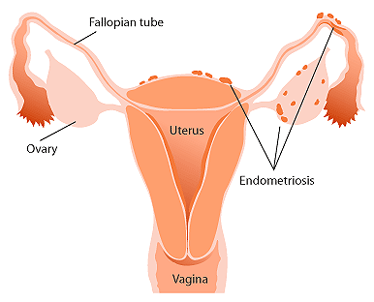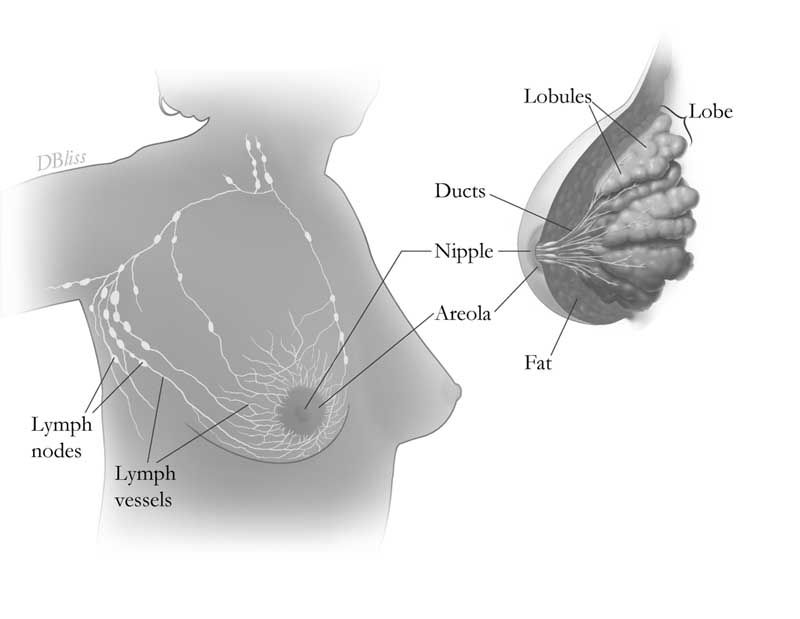- Smoking: It has been found that smoking has a direct effect on the fertility of women. Women who smoke are more prone to spontaneous abortions and ectopic pregnancies. Nicotine is believed to interfere with the action of estrogen due to which women who are chronic smokers experience an early menopause. Due to this interference, these women are said to be more prone to endometriosis making them infertile.
- Genetic: Females who have a history of endometriosis in the family are more likely to suffer from this is future.
- Dysfunction of the immune system: It has been found that women who have immunological defect are more prone to this condition.
- Environment: Studies have shown a relationship between the environment and endometriosis. It states that toxins in the environment can have adverse effect on the condition.
Symptoms
- Pain during menstruation: Women experience severe pain at the time of menstruation. The pain is more severe around the bladder, bowel, umbilicus and perineum. The pain is severe and cutting across the uterus.
- Pain before menstruation: The women experience severe pain before the onset of menstruation. The severity of this pain is high and it radiates from the back to the uterus of the women.
- Pain during intercourse: These women intense experience pain during intercourse.
- Low back pain: There is continuous pain in the lower back, even when the women in not menstruating. This pain lasts through the month
- Heavy and irregular periods: Some patients experience heavy periods while others may have normal bleeding but the cycle is irregular.
- Painful bowel movements: During the menstrual cycle, women find it hard and painful to pass stool.
- Painful urination: During the menstrual cycle, pausing urine become pain and the woman has to stress a lot.
- Fatigue: The patients are chronically fatigued and tired.
- Severe diarrhea and constipation
- Some patients also experience headache, low grade fevers, depression and anxiety.
Treatment:
Endometriosis can be treated through-
- Surgery: Depending on the severity, patient can opt for surgically removing the mass. This can be in the form of
- Conservative surgery: Reproductive potential is retained
- Semiconservative: The reproductive ability is eliminated but the ovarian function is retained.
- Radical: This is where the women may have to go for hysterectomy i.e. , the whole uterus is removed.
- Medical therapy: The female may be put under combination oral contraceptive pills (COCPs), danazol, progestational agents and GnRh analogs






 Fruits are known for their potential in providing important supplies of vitamins and other such nutrients to the body. In case of pregnant women two servings on daily basis can help the mother as well as the baby to stay healthy.’ Try ingesting fruits of different colors and mostly rely on fiber rich fruits which can help to prevent pregnancy side effects such as hemorrhoids. Two servings of fruits are ideal for expecting mothers on daily basis.
Fruits are known for their potential in providing important supplies of vitamins and other such nutrients to the body. In case of pregnant women two servings on daily basis can help the mother as well as the baby to stay healthy.’ Try ingesting fruits of different colors and mostly rely on fiber rich fruits which can help to prevent pregnancy side effects such as hemorrhoids. Two servings of fruits are ideal for expecting mothers on daily basis.  Dairy products are considered as one of the most beneficial categories of food for pregnant ladies as it provides required nutrients to both, the baby and mother. Dairy products are rich source for obtaining calcium and Vitamin D. You can intake any dairy item ranging from milk to cheese. In case you are intolerant to any of such products, you can substitute it with soy. Other sources of required nutrients are vegetable, beans, meat and certain helpful oil such as canola oil etc, are some important sources that can help you gain required energy during pregnancy.
Dairy products are considered as one of the most beneficial categories of food for pregnant ladies as it provides required nutrients to both, the baby and mother. Dairy products are rich source for obtaining calcium and Vitamin D. You can intake any dairy item ranging from milk to cheese. In case you are intolerant to any of such products, you can substitute it with soy. Other sources of required nutrients are vegetable, beans, meat and certain helpful oil such as canola oil etc, are some important sources that can help you gain required energy during pregnancy. 